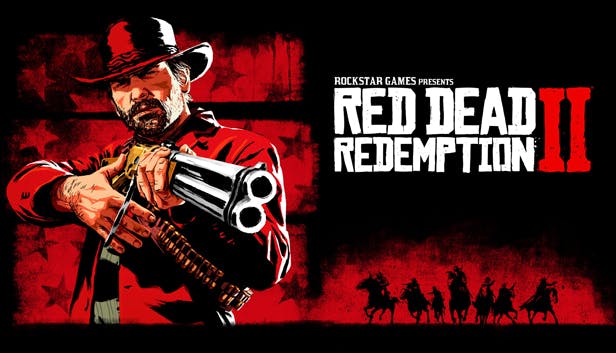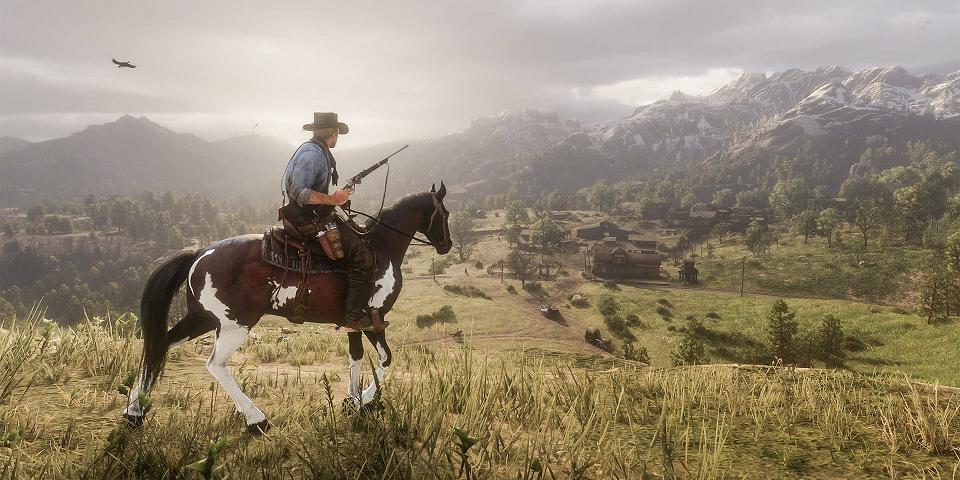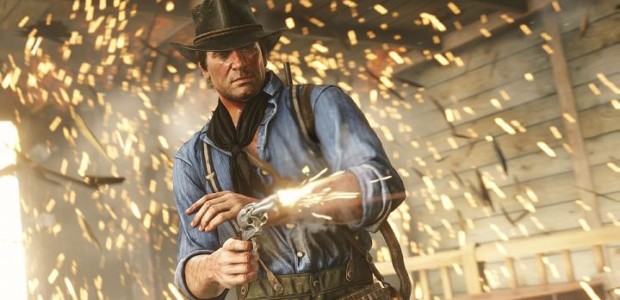
“We’re more ghosts than people”- Arthur Morgan
The antihero has long been a valuable toolkit of Rockstar Games’ repertoire when it comes to painting the characteristics of the various roughnecks that make up the volume of games in their deep catalogue. With the launch of their landmark title, 2010’s Red Dead Redemption though, a curious thing happened, they took their antiheroes and began to color them with profound depth and maturity, a long way from the various cartoonish maniacs rampant in their earlier titles. Thusly, Rockstar Games presented us with the concept of the noble antihero. John Marston was a character with weight, with a sense of purpose – someone whose past was recklessly colliding with his present to a violently, tragic ending is one that not only felt perfectly adequate within the world of the western, but one that I would have argued was one of this decade’s greatest endings to anything in media. That is until I met Arthur Morgan (performed by Roger Clark) and played through 2018’s Red Dead Redemption 2, a game and a character that still haunts me to this day.
When we first meet Arthur in the game, he and his gang, led by the Daniel Plainview-esque, Dutch Van Der Linde (Benjamin Byron Davis) are hiding out in the snowy wilderness after a failed heist and subsequent attraction of the law has left them destitute and on the run. Our first interpretation of Arthur is grizzled cowboy, one who has seen some heavy stuff throughout his life, one who has committed violence for purposes that have become increasingly muddled as the years go by, and will become even murkier as the game moves on. It’s a testament to the writers and Clark’s acting that at first glance, Arthur is a bruiser – a fella who gargles rocks for breakfast and cleans his teeth with a grill brush. But, he’s also a soft soul, the kind to tip his hat to a woman as she passes and the kind who takes a kid out to fish and bond when he senses his father (that would be John Marston, meaning Red Dead Redemption 2 is prequel territory) isn’t doing his duty. I’ll admit, I wasn’t too keen on seeing another character replace Marston as the playable character in another Red Dead entry, but then with one brawl, everything changed
As events progress, Arthur and his compadres begin to perform missions (like heists) that begin to fatten up their nest egg so they can escape to paradise. One such task involved getting money back from the people that the gang loaned said money to. It seemed simple enough, and as Arthur whaled on one sickly farmer, the man’s wife and son crying out for him to stop, a fleck of bloody spittle hits Arthur on his mouth, and that’s pretty much when it all changed. Now, I didn’t think too much of it at the time, and after all, it could’ve been nothing – the farmer could have been sick for a myriad of reasons. But it’s the late 1800s, and there were some lethal transmittable diseases around. And I know, it’s a prequel, and Arthur’s not around for the “follow-up,” but again, that doesn’t necessarily matter. Maybe there’s a happy ending ahead, right? Yet, as we progress through mission after mission, Arthur getting winded from running, coughing profusely into his handkerchief – it felt inevitable. As we wind up towards the final acts of the game, Arthur collapses, his pallor sickly white, and he stumbles into a doctor’s office to hear the news – he has tuberculosis. The news hits him like a freight train, as it does us, the player. Arthur is going to die.

“There is a good man within you Arthur, but he is wrestling with a giant.”
I played Red Dead Redemption 2 very slowly, like sipping a fine whiskey on a porch while watching the sun set. That’s how the game is truly meant to be played, honestly. But I began to play it even slower once Arthur’s terminal diagnosis was delivered. Because moving towards the end of the game meant I was handily delivering Arthur towards his early grave. I wanted to soak in the very rich life this person lived: going to the movies with his estranged love, learning about the heartache of losing his wife and child, murdered by thieves over ten dollars (a facet of his life that he reluctantly speaks about), the nights wandering around the camp and watching people drink and eat by the campfire and brushing my horse on a rainy day. Those memories would be gone all too quickly. It’s a curious thing: we play games where our character dies, but often it’s because we failed in one way or another. Here, you’re playing as someone who’s living with an incurable disease, one that you end up with living with just as much as him. And it’s interesting in the way you begin to realize the actions you perform in the game could affect Arthur’s well-being. The spell the writers and designers weave over you is that powerful.
I played with a high honor, which meant that events surrounding the fatal ending of the game would be mostly positive, though still overwhelmingly tragic. There’s a deeply touching moment that happens when Arthur encounters a nun who he has interacted with incrementally throughout the game. He discloses to her that he’s dying and in that moment it’s allowing us a glimpse behind Arthur’s veil, showing us his naked vulnerability. The way that Roger Clark’s voice cracks when he says, “I guess … I’m afraid…” It’s amazing. Later, the game gives you the option when doing your loan sharking missions to absolve debts rather than collect on them which is a superb tweak to the game mechanic and the way the story allows you to make amends, slowly, with the spouse of the dying man you once harmed is a nice detail that most writers wouldn’t even think of. All of these elements add up to an important choice that you face controlling Arthur Morgan, one that is discussed on the many dusty rides you take with your companion, Charles – when faced with the end, do you shrink in defeat, or do you stand tall? I chose the latter.
As Arthur succumbs to his illness, fighting the now insane Dutch and his cruel sidekick, Micah, Arthur laments that all of it – the heists and the chaos that they committed in pursuit of the almighty dollar, was pointless, and that hit me right in my heart, because I was the one who did all those things, and for what? Arthur’s dead and the bad guys essentially win. All of it … was for nothing. It’s so grimly fatalistic. “I gave you all I had… I did” are Arthur’s last words to Dutch, a man he looked up to and rode with for day and nights. And this is how it ends with Arthur dying while watching the sunrise. The epilogue with John Marston, while fun, actually puts a damper on the events, because nothing could really come close to the events of the game with Arthur Morgan, and I believe going forward, nothing will. I like to think about the quiet, tremendous moment of Arthur riding his horse to what would be his final resting place, the voices of the past echoing through his head, accompanied by one of the most haunting songs I’ve heard in a long time – “That’s The Way It Is,” by Daniel Lanois. It stays with me. It haunts me.
Tags: Reflections, Rockstar Games, Roger Clark, Video Games, Westerns


No Comments